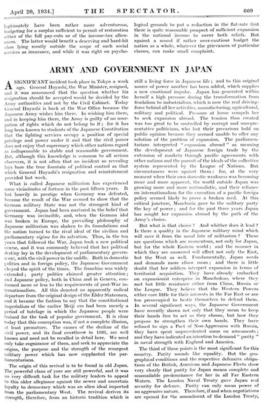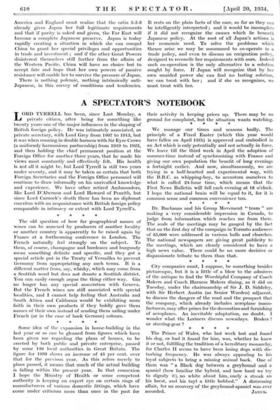ARMY AND GOVERNMENT IN JAPAN A SIGNIFICANT incident took place in
Tokyo a week ago. General Hayashi, the War Minister, resigned, and it was announced that the question whether his resignation should be accepted would be decided by the Army authorities and not by the Civil Cabinet. Today General Hayashi is back at the War Office because the Japanese Army wishes him there. In wishing him there, and in keeping him there, the Army is guilty of no usur- pation of rights which do not belong to it ; for it has long been known to students of the Japanese Constitution that the fighting services occupy a 'position of special privilege and power under it and that the civil power does not enjoy that supremacy which other nations regard as indispensable to stable and reasonable government. But, although this knowledge is common to all serious observers, it is not often that an incident so revealing lays bare the true fountain of political control as that which General Hayashi's resignation and reinstatement provided last week.
What is called Japanese militarism has experienced some vicissitudes of fortune in the past fifteen years. It lost heavily in prestige when Germany was defeated, because the result of the War seemed to show that the German military State was not the strongest kind of government. Japan had been nurtured in the belief that Germany was invincible, and, when the German idol was broken in Europe, the prevailing philosophy of Japanese militarism was shaken to its foundations and the nation turned to the rival ideal of the civilian and parliamentary regime for its salvation. Thus, in the ten years that followed the War, Japan took a new political course, and it was commonly believed that her political destiny lay in the development of parliamentary govern- frent, with the civil power in the saddle. Both in domestic r olitics and in foreign policy, the Japanese Government obeyed the spirit of the times. The franchise was widely extended ; party politics claimed greater attention ; and Japanese policy, both in China and in Geneva, con- formed more or less to the requirements of post-War in- ternationalism. All this denoted an apparently radical departure from the original design of the Elder Statesmen, and it became the fashion to say that the constitutional imperialism of the earlier Meiji era had been merely a period of tutelage in which the Japanese people were trained for the task of popular government. It is clear today that this conception was, if not a complete illusion, at least premature. The causes of the decline of the civil power, and its final overthrow in 1931, are well known and need not be recalled in detail here. We need only take cognizance of them, and seek to appreciate the origins, the purpose and the strength of the resurgent military power which has now supplanted the par- liamentarians.
The origin of this revival is to be found in old Japan. The powerful clans of yore are still powerful, and it was no very difficult task for the military leaders to appeal to this older allegiance against the newer and uncertain loyalty to democracy which was an alien ideal imported from the parliamentary West. The revival derives its strength,. therefore, from an historic tradition which is still a living force in Japanese life ; and to this original source of power another has been added, which supplies a new emotional impulse. Japan has generated within herself a high pressure during the transformation from feudalism to industrialism, which is now the real driving- force behind all her activities, manufacturing, agricultural, military and political. Pressure at home compels her to seek expansion abroad. The tension thus created was too great to be controlled by corrupt and unrepre- sentative politicians, who lost their precarious hold on public opinion because they seemed unable to offer any solution of the problem of expansion. The parliamen- tarians interpreted " expansion abroad " as meaning the development of Japanese foreign trade by the extension of markets through pacific agreements with other nations and the pursuit of the ideals of the collective system represented by the League of Nations. But circumstances were against them : for, at the very moment when their own domestic weakness was becoming more and more apparent, the world outside Japan was growing more and more nationalistic, and their reliance on internationalism for the execution of a pacific foreign policy seemed likely to prove a broken reed. At this critical juncture, Manchuria gave to the military party the key of power ; and for the past three years Japan has sought her expansion abroad by the path of the Army's choice.
But what is that choice ? And whither does it lead ? Is there a quality in the Japanese military mind which will save it from the usual fate of militarism ? These are questions which are momentous, not only for Japan, but for the whole Eastern world ; and the manner in which they are answered will affect not only the East, but the West as well. Fundamentally, Japan needs and demands more elbow room ; and there is little doubt that her soldiers interpret expansion in terms of territorial acquisition. They have already embarked on expansionist enterprise in Manchukuo, where they met but little resistance either from China, Russia or the League. They believe that the Western Powers either care little for their interests in the Far East or are too preoccupied to bestir themselves to defend them. In several significant ways, the Japanese Government have recently shown not only that they mean to keep their hands free to act as they choose, but how they propose to strengthen their own hands. They have refused to sign a Pact of Non-Aggression with Russia, they have spent unprecedented sums on armaments ; and they have indicated an intention to demand " parity " in naval strength with England and America.
The third of these points is the most significant for this country. Parity sounds like equality. But the geo- graphical conditions and the respective defensive obliga- tions of the British, American and Japanese Fleets show very clearly that parity for Japan means complete and unassailable predominance for her in all Far Eastern Waters. The London Naval Treaty gave Japan real security for defence. Parity can only mean power of an aggressive nature. Therefore, if and when negotiations are opened for the amendment of the London Treaty, America and England must realize that the ratio 5-5-3 already gives Japan her full legitimate requirements and that if parity is asked and given, the Far East will become a complete Japanese preserve. Japan is today rapidly creating a situation in which she can compel China to grant her special privileges and opportunities in trade and investment ; and if the other Great Powers disinterest themselves still further from the affairs of the Western Pacific, China will have no choice but to accept fate and hope that her own powers of passive resistance will enable her to survive the pressure of Japan.
There is nothing polemic, nothing intrinsically anti- Japanese, in this survey of conditions and tendencies. It rests on the plain facts of the case, as far as they can be intelligently interpreted ; and it would be incomplete if it did not recognize the causes which lie beneath Japanese policy. At the root of all Japan's actions is her economic need. To solve the problems which thence arise we may be summoned to co-operate in a trade policy, and even to discuss an emigration policy, designed to reconcile her requirements with ours. Indeed such co-operation is the only alternative to a solution sought by force. If Japan will recognize, that by her own unaided power she can find no lasting solution, we can treat with her ; and if she so recognizes, we must treat with her.













































 Previous page
Previous page